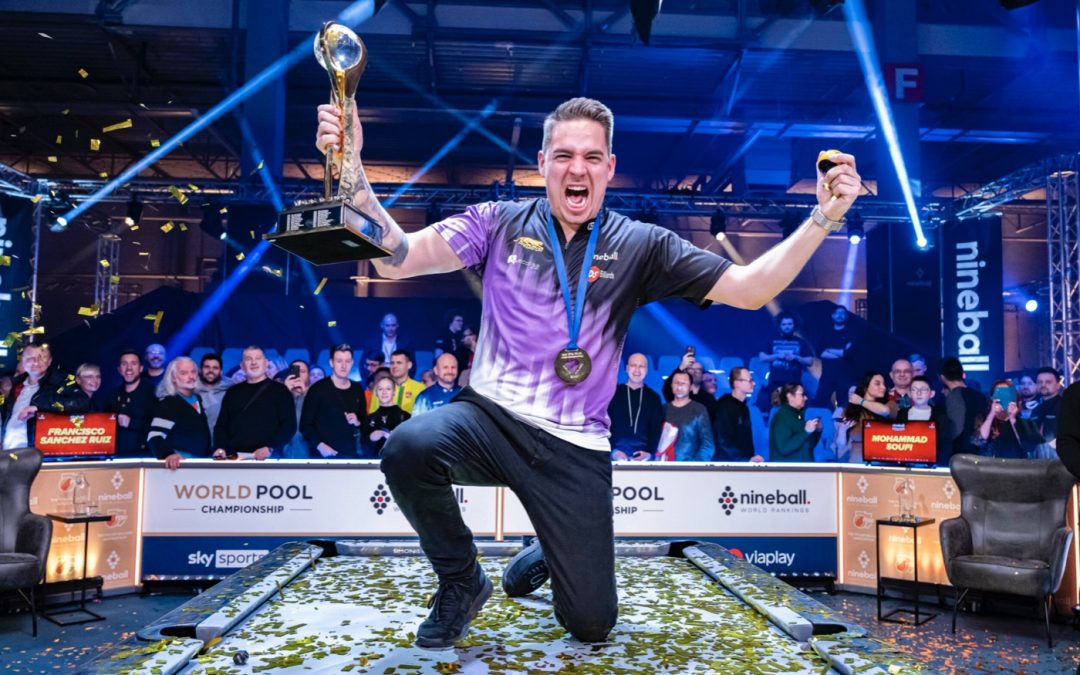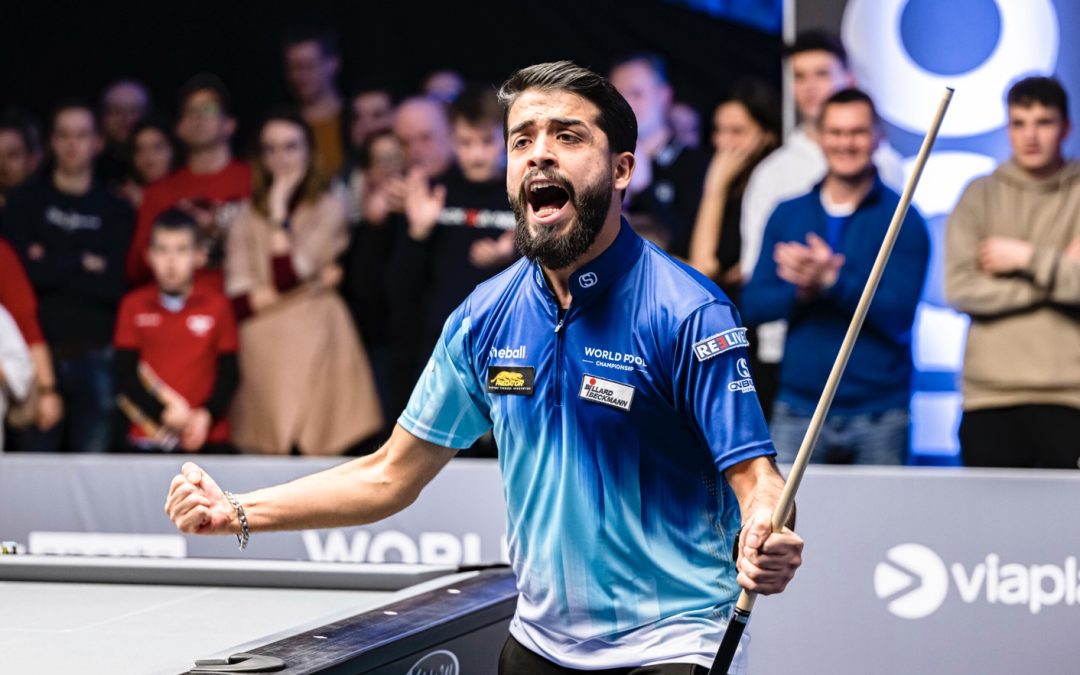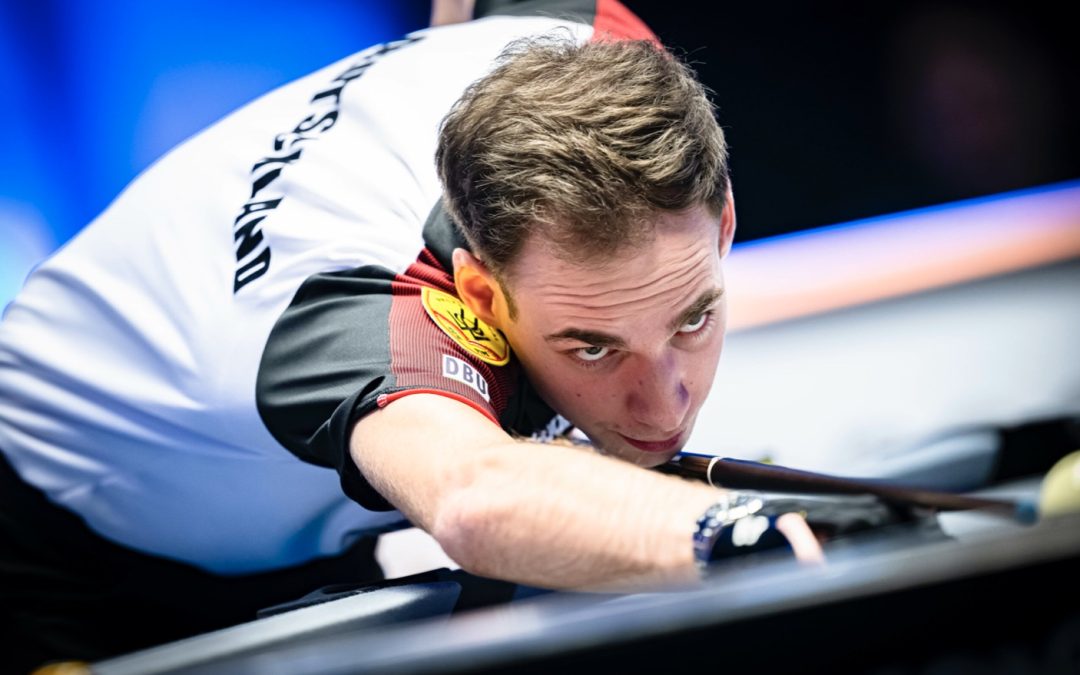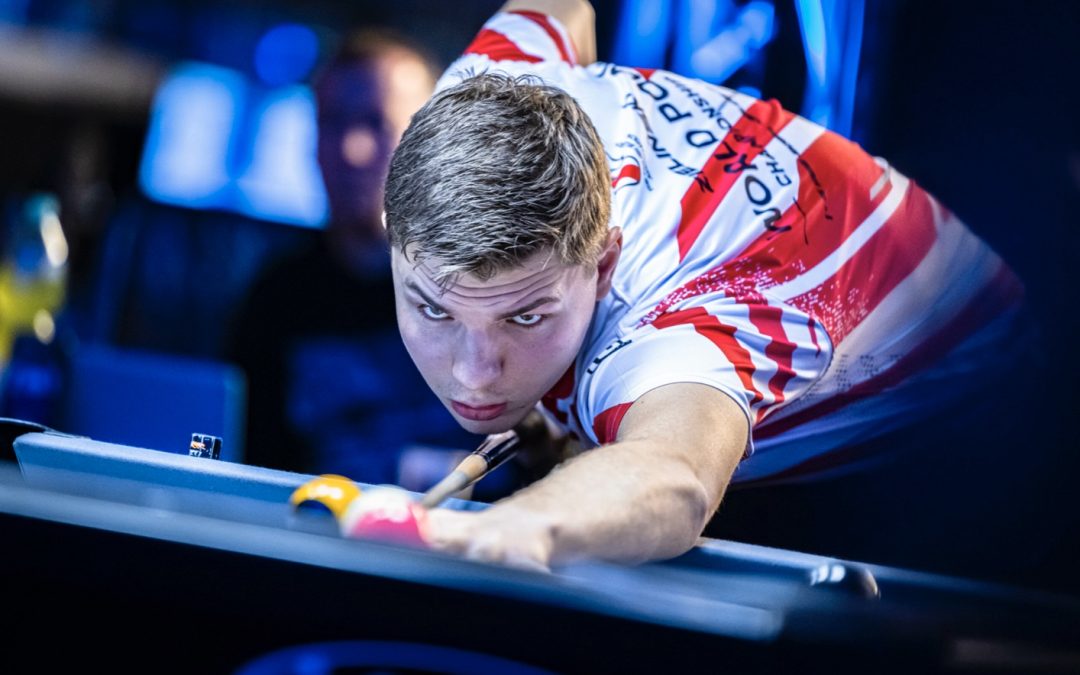By Ted Lerner
WPA Press Officer
Germany’s Thorsten Hohmann kicked off his campaign in the 2013 World 9-ball Championship in Doha with a resounding 9-4 defeat at the hands of Taiwan’s talented Lo Li Wen. But as he packed up his cue and walked out of the arena, he didn’t seem the least bit bothered by being on the ropes so early in the event. In fact, he exuded confidence.
He told me he wasn’t upset by the loss because he felt like he was in stroke and that it was just a matter of time before the balls started rolling his way. When I asked him how he could be so pumped after a big defeat, he mentioned his win the week before in New York City where he captured the World Straight Pool tournament in New York City. Hohmann insisted he was in stroke and that all he had to do was get some rest, shake off the last vestiges of jet lag and a small cold, and all would be fine.
As it turned out, Hohmann knew exactly what he was talking about. He romped in his next group stage match against Iranian Mehdi Rasekhi, then downed Hall of Famer Francisco Bustamante in a cracker of a battle to advance to the final 64. By then the jet lag and the cold had clearly worn off and the German proceed to log an awe inspiring three days that catapulted him all the way to his second World 9-ball Championship. Along the way, he took down a “Murderer’s Row” of great pool talent, including, Japan’s Toru Kurabayashi, defending Champion Darren Appleton, the Philippines superstar Dennis Orcollo, Filipinos Jeff De Luna, Carlo Biado, and then Antonio Gabica in the finals.
With the win Hohmann became only the third person to ever win two World 9-ball Championships. It also surely cemented his place in pool’s pantheon, the BCA Hall of Fame, which the German will be eligible for when he turns 40.
Now in his 22nd year playing professionally, the 34 year old from Fulda, Germany has carved out a phenomenal career that allows him to travel the globe, and make him a threat to win any event he enters. He first burst onto the pool scene with his surprise win at the 2003 World Pool Championship in Cardiff. He was so unknown then that most pool fans expected his win to represent a one hit wonder. But Hohmann used that first world title as a springboard to greatness that hasn’t subsided in the decade since. He has won some of pool’s biggest events, including the IPT North American Open(2006), the China Open(2009), All Japan Open(2010), the Philippine Open(2011), the World Cup of Pool(with fellow German Ralf Souquet, 2011), and three World 14:1 tournaments.
I recently caught up with the friendly German in late May in Manila. He was in town visiting some friends and preparing for the China Open in Shanghai.(he made it to the quarterfinals.) Pool being what it is, with hardly any big events in the first half of the year, Hohmann’s season was just about to get into gear.
Over the course of our interview, it was clear that Hohmann doesn’t let the lack of major events slow him down. When pool is not in season, he stays focused by working out nearly every day. He also travels the world taking care of sponsor commitments, playing in smaller events and enjoying the fruits of his labors to the hilt. And Hohmann has no intention of slowing down, which means pool fans can expect to see the German playing at the top levels of the sport for many years to come.
With the World 9-ball Championship coming in June this year, Hohmann will only get to enjoy 9 months on the throne. That is unless, of course, he repeats. The German great knows that winning a world championship can often come down to circumstance and a bit of luck so he wasn’t willing to predict another win this week in Doha. But everyone and their brother knows that “the Hitman” is a real threat in any event he enters.
And while he wouldn’t guarantee victory, he did have this ominous thing to say when asked how he’ll perform against 127 of the best players on the planet for pool’s most prestigious prize; “I can promise they’ll have to play their best to beat me.”
TL: The World 9-ball is coming up. After you won the tournament last September, get us up to date with what you have been doing in the last 9 months.
TH: After the World 9-ball Championship I had quite a few tournaments I had to play and I was successful, the week after I won the Maryland straight pool tournament. And then I won the Kremlin Cup in Moscow. It was my first appearance in Russia ever so I was very happy about that. And then, like in the past few years, it’s been quiet, I always get a slow start, not too many tournaments to play in from January to about May. With the China Open next week, it will be the beginning of my season and then I have the highlight with the World 9-ball Championship in Qatar so I’ll get really busy again.
TL: Let’s go back to the World 9-ball Championship last year. You’re always a threat to win a tournament but I don’t think people were really looking at you so much to win. But I remember during the tournament you were super confident even after you lost your first match in the group stage. And then you started to pick up the confidence. Did you feel all along that you could win the tournament?
TH: If I look at my track record in the past after winning a big straight pool tournament I usually follow it up with another huge tournament win. You know I just came from the straight pool win in New York and I was full of confidence and I was in stroke. You can never predict how a tournament is going to go, it depends on the draw, you can play 100% and your opponent plays just a little bit better. But I was certainly confident, I had my opportunities and then I escaped Kurabayashi with an 11-10 win (in the round of 64), and from there on I just got into a groove and went through all the Filipinos.
TL:Yes you beat 4 out of 5 Filipinos along the way. That is just an incredible statistic when you look back on it isn’t it?
TH: Oh it was tough mentally because I wasn’t only playing my opponents, there was roughly about 1000 Filipinos rooting against me. I guess that just brought out the best in me and it put a little bit extra pressure on my opponents. I think that could’ve cost (Antonio) Gabica the title at the end because he had a good lead against me and I guess the pressure got to him at the end. And I knew if I could stay with him and keep the pressure up he’s going make a mistake and that’s what happened. I’ve always played my best at the end, the last few matches of the World Championship including the final.
TL: He was up 6-4, he missed an easy 5-ball, there was a big gasp, he seemed to lose all his confidence. Did you sense at that point that he was ripe for the taking?
TH: You never know. He could miss and get right back in it and it’s all about opportunities and I used my opportunities, he made a couple of mistakes, I got lucky once I tried to bank and it went in off two rails. So it all comes together and all you have to do is try your best. Of course if your opponent makes a mistake at the end it gives you an extra boost of energy and maybe boosts your confidence to the next level. I’ve been playing for 22 years I know how it works.
TL: A lot of people might say; ’What does 14-1 straight pool have to do with 9-ball. They are totally different disciplines.’ For you what is the relationship between the two?
TH: Personally I grew up playing straight pool. And when I’m in stroke, I’m in stroke it doesn’t matter what game I play. It’s just that straight pool gives me this confidence that’s required. At one point we all have good technique and we all know how to make the shots, and we play the right game, but to have this confidence and the will to win and succeed at the end, that comes from somewhere else and I draw that energy from my straight pool game. If I know I can run 100 balls and I can win a tournament that gives me so much confidence, it doesn’t matter what game I’m playing next. It works for me.
TL: So will you practice 14-1 straight pool before these big 9-ball events?
TH: Well this year’s a little different because the World 9-ball Championship is already in June and last year it was in September. And I haven’t had the preparation like I had last year. I’m trying to stay in shape like I did last year. I work out 5-6 times a week at the gym which I’ve been doing for the past few months. That helped last year so why not do the same thing this year. I have the China Open about two weeks before the World 9-ball Championship, so hopefully that will give me some time to get into the tournament groove. I’ve been practicing a lot, I’ve been playing well. I finished 2nd in a tournament in Canada and went through a minefield of players there. So I know my game is there. I just have to be 100% focused when the time is there. I will try my best.
TL: The World 9-ball Championship is obviously very difficult to win, anything can happen. The rules seems to be set up to make it a wide open game in which anybody can win, even lesser players. Does it make it more difficult to win because it’s so wide open and players are making so many balls on the break?
TH: Honestly I don’t think about what game would be the best to benefit the better player because in the end I can’t change it. I just try to do my best when I get there. I had an American player ask me, ’What do you think would be the best game for us Americans to play so we can win tournaments again?’ I said, ’No, no, no. you are approaching this from a different angle. You have to figure out what can you do to do your best to win a tournament.’ And that’s my approach.
I love 9-ball. I think it’s a great game. People think 10-ball is better because the break is tougher and there’s an extra ball. But for me there’s something about 9-ball. It’s faster, it’s action. You know there’s luck involved, there’s the draw, the break. I don’t even know which racking system we are going to be using so maybe that evens it out for the players. So all I can do is try my best, that’s how I approach it. I don’t try to think about the rules.
TL: And one thing I’ve noticed, and I hear lots of complaints from players saying the rules should be changed to this or the rules should be changed to that, or we should go back to old time 9-ball, but at the end of the day in any tournament when the pressure is on, the crème usually rises to the top doesn’t it?
TH: Yes, even though maybe 9-ball is an easier game than 10-ball, you don’t see too many players run out sets. There’s plenty of mistakes that players make, including myself. So again it doesn’t matter what game you play, what rules, you just have to be mentally right there, you have to be in shape and train and do your best.
TL: You won the World 9-ball Championship ten years ago for the first time. How did the one last year that you won compare to the first one?
TH: Well ten years ago that was my major breakthrough and the stage was amazing. To win in Cardiff, if you remember the Matchroom setup, the arena, the spectators, the live television, the interviews, it was just top class entertainment. So that was very special to me and that set the stage for me to have an incredible career the last ten years winning tournaments all over the world. It gave me the opportunity to be a professional player.
After ten years, yes it was satisfying. I think I’m on top of my game and I had to play the top players in the world. I had to beat Darren Appleton who was the reigning world champion last year. I beat Dennis Orcollo who is considered one of the best in the world. So that was very satisfying. Unfortunately there was not the coverage like ten years ago. I wish there would be more publicity and the media coverage because you know you want to preserve it for future generations so they can look back and see that this was a major event. But nevertheless, it still felt great. I’ve proven to many players and people that I can still do it. But it only lasts for so long and we have a new world championship coming up. It will be unbelievable to do it again.
TL: After that, a lot of people were saying hey, Thorsten’s having a great year, won the 14-1, won the World 9-ball Championship, you’re having a great year, and that you should have been on the European Mosconi Cup team. You weren’t picked for the Mosconi Cup team. How disappointing was it not to be picked to play on the Mosconi Cup team?
TH: You can ask any player from the United States and Europe what is the one tournament they want to play in and they’ll all say the Mosconi Cup. It’s just very special to play for your continent in front of hundreds of people in Vegas or in London, and the publicity you get and the pressure. It’s just a totally different level. That’s how we want to compete. It was disappointing for me having won so many tournaments and not getting picked but I know the Mosconi Cup is a business, it’s entertainment and one year you get picked where maybe you shouldn’t have been picked, and the next year you think you should be and you don’t. Ultimately it’s Matchroom that makes the decision for their business and well, hopefully in the future I’ll get picked again.
At this point again my season is starting to get serious. I have some crazy travel coming up. I’m going to Vegas for an invitational event, then right back to China for the World Team and then straight back to New York for the Straight Pool. So I have a lot of good tournaments coming up and that’s what I focus on, one by one, and I don’t think of the Mosconi Cup at all. If they want me, they’ll invite me. I just want to play my best.
I’m very picky of the tournaments that I play in because I want to enjoy myself. There’s some local tournaments that I skip because I’m at a stage where I really want to enjoy myself. So I pick the highlights, the good tournaments, and that’s what I focus on. It’s taken me 20 years to find balance between practice and my social life. And last year I think I found a really good balance so that I’m hungry again, perform, spend the time that is required to play my best, at the same time don’t get burned out. I do a lot of activities. If you go on my social media, my Facebook page, my Instagram page you’ll see I do crazy stuff, to find that balance.
TL: You’ve been at it for 22 years. How do you stay interested, excited, and geared up for pool, because pool is no picnic as a professional sport?
TH: I’m supported by the best companies in the business. Lucasi Cues they’ve been with me for ten years. Kamui products, Simonis Cloth, and Cue Pod. They support me which makes it easier for me. I don’t have to play every single tournament. I can pick the ones that I want to play. If I had to play every tournament it would make it tougher. So when I go to a tournament I’m hungry and I want to win. I want to make sure I spend a few quiet hours to be ready, to be in stroke, to be mentally prepared. The first few months of the year were quiet so I can focus on my fitness and other things and now I want to play tournaments. I’m ready.
TL: So you really don’t get burned out on pool and the key is to have other things outside of pool in your life.
TH: Exactly. I still love playing pool. It’s my hobby, it’s my life, I enjoy competing. I think I still have lots to learn. Various games I still have to improve on like one-pocket, bank pool which will ultimately benefit my game in general. And there’s still some tournaments out there that I haven’t won. And I like to travel the world. That’s one of the privileges that I really cherish is to travel the world and make friends all over and compete and hopefully inspire some other generation to do the same thing and to play pool on a very competitive level. Honestly I can’t wait to play in China, to play in Qatar and to play in whatever is coming up next.
TL: What is your greatest memory in pool after two decades in the game?
TH: I had so many ups and downs. Winning my first major event, being part of the IPT, winning the World Cup of Pool with Ralf a hero I looked up to when I was 12 years old. There are so many highlights I have had I couldn’t really pick one, it’s tough.
You are competing in a sport that always seems to trip over itself and can’t seem to unite and can’t get the big international exposure. What does pool have to do to take it to the next level?
TH: Well I hope that pool will spread out more and become more popular in different parts of the world. I try to do my best to be a good ambassador and hopefully the players and everybody in the industry can unite and bring pool to a level it deserves so it will give more opportunities for players to compete in big events that are televised and give them a chance to make a living.
TL: In Thorsten Hohmann’s eyes, the world champion, what is it about the sport of pool that is so special, that people don’t understand?
TH: First of all, if you look at the game itself and the challenges involved both physically and mentally. It’s solving puzzles, it’s like learning a language. I can play a guy in Taiwan or Australia or Brazil and we all speak the same language, which is playing pool. To master the table physically and at one point it becomes all mental, to pick the right shots and stay cool under pressure and to learn how to lose and deal with it and be a sportsman, there are so factors in pool. It can be played anywhere, by anybody. There are no age limitations. You can be a man or a woman, you can be short or tall, you can be young or old, it doesn’t matter, anyone can play. I’m still 34 years old, and if you look at Ralf or Efren (Reyes), they have ten 20 more years playing pool on their back and they are still competing, so I still have many more years to come. Pool is played worldwide. Everybody plays pool. If we can unite pool and bring the players together, bring the federations together and the industry and create a product…the problem is pool is very sophisticated sport, it’s very difficult to understand, so we need to find a way that makes it exciting to watch as well as to play. If the world understands it, it can be the best sport in the world.
TL: Give us your final thoughts about the upcoming World 9-ball Championship and what we can expect to see from the defending world champion this year.
TH: I’m always very objective. I’m playing very good pool. I’m ready. I’ve put in the hours. I’ve still got a couple of weeks to prepare. I’m in shape, I’m fit, I’m mentally there, I’m hungry. It depends on the draw and how I feel that day. I will give my best just as last year. I’m trying to win. I know there will be plenty of competition, there will be hungry players who want to do the same thing. But I can promise they’ll have to play their best to beat me.
*To watch the actual interview please CLICK HERE.
**The 2014 World 9-ball Championship takes place at the Al Saad Sports Club in Doha, Qatar from June 16-27. The winner of the 2014 World 9-ball Championship will receive $30,000. The runner up will receive $15,000. The total prize fund is $200,000.
The players will be competing on Wiraka New Model Tables with Simonis 860 Cloth, Electric Blue Color and using Aramith Super Pro TV Balls.
The Qatar Billiard and Snooker Federation, which is once again hosting and organizing the World 9-ball Championship, will be providing free live streaming of the entire tournament on its website, http://live.qbsf.qa/.
The WPA will be on hand in Doha throughout this year’s World 9-ball Championship providing up to the minute information, live scoring, photographs and in depth articles with insights and analysis from WPA Press Officer Ted Lerner.
Fans can interact with us through the WPA’s official Facebook Page for the event at this link;https://www.facebook.com/wpaworld9ballchampionship
The WPA is also on Twitter; @poolwpa
For more information you can also visit the WPA website at www.wpapool.com. Fans can also visit the website of the Qatar Billiard and Snooker Federation at; www.qbsf.qa
*The 2014 World 9-ball Championship will be held in Doha, Qatar from June 16-27,2014 and is sanctioned by the World Pool & Billiard Association(WPA), the world governing body of the sport of pocket billiards. 128 players from across the globe will compete for the most prestigious prize in Men’s Pool. The 2014 World 9-ball Championship is a WPA ranking event.









